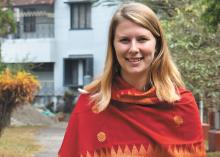In the last few months with Mennonite Central Committee’s Serving and Learning Together program, I have thought often about how we all use stories to communicate. And how sometimes I have found myself wishing I could politely use a bookmark to pause someone’s story when I wasn’t that interested in it.
I’ve agonized over accidentally choosing the seat next to the friendly commuter on public transport or the extremely talkative colleague during lunch break. I’ve dreaded becoming the audience of one for these unprompted personal monologues. I remember how I used to scrunch my forehead and squint my eyes to model listening, even though I wanted to retreat into my own mind and not hear a single word.
But here in northeastern India, I have been reminded that it is no small thing for someone to tell a story. As I live here and work for a health organization providing support to people living with HIV-AIDS, I now find myself scrunching my forehead and squinting my eyes out of physical strain to understand what the Hindi speaker is trying to communicate to me. Although I am a foreigner asking about a highly stigmatized and deeply personal health condition, the program participants always inspire me with their willingness to share about their experiences.
These participants must trust the interpreter to translate accurately and must trust me not to betray the details they provide or the confidentiality of their status. Thanks to their bravery and the generosity of my interpreters, I have been privileged to learn so much from the stories they choose to tell.
Sharing requires vulnerability, courage and a community that is willing to listen. As I’ve moulded my thoughts through a new country, new culture and new language, sharing becomes increasingly difficult. It is tempting to bookmark myself and simply observe.
I’ve been surrounded by people living with HIV-AIDS who share their experiences, their family members who are committed to helping me memorize the family tree, and colleagues struggling through English sentence construction to share their views on topics like arranged marriage.
Thanks to their stories, though, I feel I can be braver in my expression despite the temptation to retreat. And through storytelling, the people of my community have been able to define themselves in their own words, and I have been able to understand, be understood, love and feel greatly loved as a result.
Read more Focus on Education stories:
Learning to live with technology
RJC: Becoming a missional school
Strangers become friends at college
'Nobody is perfect and that's okay'
The servant heart



Add new comment
Canadian Mennonite invites comments and encourages constructive discussion about our content. Actual full names (first and last) are required. Comments are moderated and may be edited. They will not appear online until approved and will be posted during business hours. Some comments may be reproduced in print.